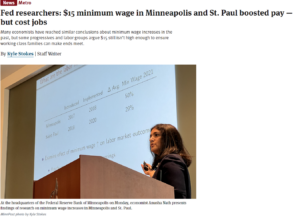Cities all over the country are mandating that businesses raise their minimum wages. The claim is that minimum wages of $15, $20, or even $25 an hour are necessary for families to make ends meet.
But studies have shown that minimum wage hikes can often destroy jobs and hurt the employment opportunities of the lowest-skilled workers.
The latest comes from senior economist Anusha Nath of the Federal Reserve Bank of Minneapolis, who told a Fed conference that minimum wage increases cost jobs in Minneapolis and St. Paul.
Nath found that Minneapolis’s once-thriving retail sector has seen 28% fewer retail jobs than researchers would’ve expected from a similar city during the same five-year period.
In neighboring St. Paul, the city’s 2018 minimum wage hike was responsible for drying up nearly one-third of available jobs, the study found. In fast-food restaurants, both hours and earnings fell by more than half after the increase took effect.
David Neumark, an economist at the University of California, Irvine, said his survey of all the literature finds that most economists have concluded that raising the minimum wage has a negative effect on employment.
“I really think the debate about whether minimum wages cost jobs should be over,” said Neumark.
It is curious that the same media that insists we follow what they call “the science” in everything from COVID lockdowns to gender identity completely ignore economic study after study that minimum wage increases hurt lower-income workers.

